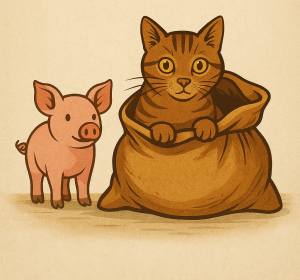As a young lad in Llanbradach, I once saved up my pocket money to buy what I thought was a match programme from a mysterious-looking man at a county cricket game. I handed over my coins, only to find the paper was blank. Lesson learned. But I later discovered there was an old expression for being deceived in just this way—and it all goes back to a cat. Or rather… a pig.
The phrase “let the cat out of the bag” means to accidentally reveal a secret—often something that wasn’t meant to be known. But the origin story is where the real fun lies…
A Trick and a Tale
In mediaeval marketplaces, merchants were known to sell live animals for food. Pigs, being valuable, were often carried in sacks—called “pokes”—to be taken home after a deal was struck.
Now here’s where it gets sneaky: an unscrupulous seller might swap a piglet for a common cat, tie it up in the bag, and hope the buyer wouldn’t check before heading home. If the buyer got suspicious and opened the bag? The cat was out—and so was the scam.
This story gave rise to the idiom. It spread across Europe, with early versions appearing in German and French long before hitting English print in the 18th century.
First Written Uses
The earliest English written record appears in 1760 in a letter between politicians. But the phrase likely existed in spoken form for centuries prior.
One variation: “Buy a pig in a poke” means buying something unseen or unverified—a companion idea that warns against blind trust. It still pops up in everyday life (and marketing!).
Modern Use and Lasting Power
These days, “letting the cat out of the bag” usually refers to spilling a secret unintentionally. You might:
-
Mention someone’s surprise party before the day
-
Talk about a promotion that hasn’t been announced
-
Leak a product launch (Apple fans know this one well!)
It remains a go-to idiom because it’s so visual, memorable, and versatile.
Roger’s Reflections
When I was a student in Cardiff, we once threw a surprise farewell for a popular lecturer. One enthusiastic student blurted out, “See you at the party!” in the corridor the day before. Cat? Bag? Gone.
These expressions link us across generations. They’re colourful, rooted in old wisdom, and just plain fun.
Language Tip
Want to keep your writing vivid? Use idioms like this sparingly and with purpose. They draw readers in—especially when paired with a quick origin story. But too many in one piece? That’s a whole other bag of cats…
Final Thought
Idioms are like family heirlooms: handed down, slightly polished, still full of charm. “Let the cat out of the bag” is a perfect example—born from trickery, embraced with humour, and now a staple of everyday English.



